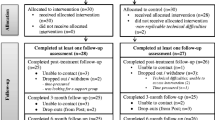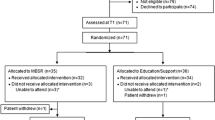Abstract
Gastrointestinal stromal tumors (GIST) account for 0.2–3% of all cancer diagnoses and are thus considered a rare type of cancer. Severe levels of fatigue occur in 33% of patients on imatinib, but besides treatment, fatigue is also associated with psychological distress. As far as we know, only one previous study has reported on the design of a psychoeducational intervention for caregivers and patients with GIST. The current study was conducted to compare the preliminary effectiveness of an Internet-delivered cognitive behavioral stress management intervention and psychoeducation program for anxiety, depression, fatigue, and quality of life in patients with gastrointestinal stromal tumors (GIST). This study had an experimental pre-test post-test design with a control group. Ninety-nine patients were randomly allocated to an Internet-delivered cognitive program (n = 50) or psychoeducation control group (n = 49). Participants completed the questionnaires at three time points (pre-test, post-test, and 3-month follow-up). Twenty-seven participants completed the intervention. A significant interaction effect between groups and time was found for general fatigue [F(2, 28) = 8.2, p < 0.001, ƞ2p = 0.25], reduced motivation [F(2, 28) = 3.5, p < 0.05, ƞ2p = 0.12], distress [F(2, 28) = 3.4, p < 0.05, ƞ2p = 0.12], and global health status [F(2, 28) = 3.8, p < 0.05, ƞ2p = 0.13]. Both intervention programs showed reductions in the dimensions of fatigue and improvements in distress and dimensions of quality of life. Additional research on a larger sample size is needed to confirm the effects obtained in this study.

Similar content being viewed by others
References
Calderillo G, Lopez H, Carbajal B, Padilla A, Herrera M (2017) P-159 Epidemiologial study of 414 gastrointestinal stromal tumors (GIST) Mexican patients. Ann Oncol 28:iii60. https://doi.org/10.1093/annonc/mdx261.1582
Wiener L, Battles H, Zadeh S, Smith C, Lee H, Kim SY (2012) Gastrointestinal stromal tumor: psychosocial characteristics and considerations. Support Care Cancer 20(6):1343–1349
Custers J, Tielen R, Prins J, Wilt J, Gielissen M, Van der Graaf W (2015) Fear of progression in patients with gastrointestinal stromal tumors (GIST): is extended lifetime related to the Sword of Damocles? Acta Oncol 54(8):1202–1208. https://doi.org/10.3109/0284186X.2014.1003960
Sodergren S, White A, Efficace F, Sprangers M, Fitzsimmons D, Bottomley A, Johnson C (2014) Systematic review of the side effects associated with tyrosine kinase inhibitors used in the treatment of gastrointestinal stromal tumours on behalf of the EORTC Quality of Life Group. Crit Rev Oncol Hematol 91(1):35–46. https://doi.org/10.1016/j.critrevonc.2014.01.002
Poort H, Van der Graaf W, Tielen R, Vlenterie M, Custers J, Prins J, Verhagen S, Gielissen M, Knoop H (2016) Prevalence, impact, and correlates of severe fatigue in patients with gastrointestinal stromal tumors. J Pain Symptom Manag 52(2):265–271
Kuhrik M, Kuhrik N, Deshields T, O'Neill JA, Zubal B (2010) Developing and implementing a local education and support program for patients with gastrointestinal stromal tumors (GISTs). J Cancer Educ 25:543–547. https://doi.org/10.1007/s13187-010-0084-z
Penedo F, Traeger L, Dahn J, Molton I, Gonzalez J, Schneiderman N, Antoni M (2007) Cognitive behavioral stress management intervention improves quality of life in Spanish monolingual Hispanic men treated for localized prostate cancer: results of a randomized controlled trial. Int J Behav Med 14(3):164–172
Antoni M, Lehman J, Kilbourn K, Boyers A, Culver J, Alferi S et al (2001) Cognitive-behavioral stress management intervention decreases the prevalence of depression and enhances benefit finding among women under treatment for early-stage breast cancer. Health Psychol 20(1):20–32
Galindo Vázquez O, Castillo ER, Benjet C, García AM, Ponce JLA, Aguilar SA (2014) Efectos de intervenciones psicológicas en sobrevivientes de cáncer: una revisión. Psicooncología 11(2–3):233–241
Antoni M (2013) Psychosocial intervention effects on adaptation, disease course and biobehavioral processes in cancer. Brain Behav Immun 30:88–98. https://doi.org/10.1016/j.bbi.2012.05.009
Mehta S, Peynenburg V, Hadjistavropoulos H (2019) Internet-delivered cognitive behaviour therapy for chronic health conditions: a systematic review and meta-analysis. J Behav Med 42(2):169–187
Zachariae R, Amidi A, Damholdt M, Clausen C, Dahlgaard J, Lord H et al (2018) Internet-delivered cognitive-behavioral therapy for insomnia in breast cancer survivors: a randomized controlled trial. J Natl Cancer Inst 110(8):880–887
Murphy MJ, Newby JM, Butow P, Kirsten L, Allison K, Loughnan S, Price MA, Shaw J, Shepherd H, Smith J, Andrews G (2017) iCanADAPT Early protocol: randomised controlled trial (RCT) of clinician supervised transdiagnostic internet-delivered cognitive behaviour therapy (iCBT) for depression and/or anxiety in early stage cancer survivors-vs-treatment as usual. BMC Cancer 17(1):193
Abrahams H, Gielissen M, Donders R, Goedendorp M, Wouw A, Verhagen C, Knoop H (2017) The efficacy of internet-based cognitive behavioral therapy for severely fatigued survivors of breast cancer compared with care as usual: a randomized controlled trial. Cancer 123(19):3825–3834
Bártolo A, Pacheco E, Rodrigues F, Pereira A, Monteiro S, Santos IM (2017) Effectiveness of psycho-educational interventions with telecommunication technologies on emotional distress and quality of life of adult cancer patients: a systematic review. Disabil Rehabil 41:870–878. https://doi.org/10.1080/09638288.2017.1411534
Vázquez G, Oscar CB, García FJ, Castillo ER, Rosas AR, Ponce JLA et al (2015) Propiedades psicométricas de la Escala Hospitalaria de Ansiedad y Depresión (HADS) en una población de pacientes oncológicos mexicanos. Salud Mental 38(4):253–258
Smets E, Garssen B, Bonke B, Haes JC (1995) The multidimensional fatigue inventory (MFI): psychometric qualities of an instrument to assess fatigue. J Psychosom Res 39:315–325
Fayers P, Aaronson N, Bjordal K, Groenvold M, Curran D, Bottomley A (2001) The EORTC QLQ-C30 scoring manual, 3rd edn. European Organization for Research and Treatment of Cancer, Brussels
Penedo F, Antoni M, Schneiderman N (2008) Cognitive-behavioral stress management for prostate cancer recovery facilitator guide. Oxford University Press, New York
Gudenkauf L, Antoni M, Jacobs J, Lechner S, Jutagir D, Bouchard L et al (2015) Brief cognitive-behavioral and relaxation training interventions for breast cancer: a randomized controlled trial. J Consult Clin Psychol 83(4):677–688. https://doi.org/10.1037/ccp0000020
van de Wal M, Thewes B, Gielissen M, Speckens A, Prins J (2017) Efficacy of blended cognitive behavior therapy for high fear of recurrence in breast, prostate, and colorectal cancer survivors: the SWORD study a randomized controlled trial. J Clin Oncol 35(19):2173–2183. https://doi.org/10.1200/JCO.2016.70.5301
Sara V, Antoni MH, Charles C, Suzanne L, Wohlgemuth W, Llabre M et al (2014) Sleep quality and fatigue after a stress management intervention for women with early-stage breast cancer in southern Florida. Int J Behav Med 21:971–981
Nater U, Maloney E, Boneva R, Gurbaxani B, Lin J-M, Jones J et al (2008) Attenuated morning salivary cortisol concentrations in a population-based study of persons with chronic fatigue syndrome and well controls. J Clin Endocrinol Metab 93(3):703–709
Lin J, Dana B, Elizabeth M, Ernestina N, Rhonda BL, William R (2009) Further validation of the Multidimensional Fatigue Inventory in a US adult population sample. Popul Health Metrics 7(1):18
Singer S, Kuhnt S, Götze H, Hauss J, Hinz A, Liebmann A, Krauß O, Lehmann A, Schwarz R (2009) Hospital anxiety and depression scale cutoff scores for cancer patients in acute care. Br J Cancer 100(6):908–912
Jamie S, Laura B, Suzanne L, Bonnie B, Lisa G et al (2015) Long-term psychological benefits of cognitive-behavioral stress management for women with breast cancer: 11-year follow-up of a randomized controlled trial. Cancer Res 121(11):1873–1881
Riba MB, Donovan KA, Andersen B, Braun II, Breitbart WS, Brewer BW, Buchmann LO, Clark MM, Collins M, Corbett C, Fleishman S, Garcia S, Greenberg DB, Handzo RGF, Hoofring L, Huang CH, Lally R, Martin S, McGuffey L, Mitchell W, Morrison LJ, Pailler M, Palesh O, Parnes F, Pazar JP, Ralston L, Salman J, Shannon-Dudley MM, Valentine AD, McMillian NR, Darlow SD (2019) Distress management, version 3.2019, NCCN clinical practice guidelines in oncology. J Natl Compr Cancer Netw 17(10):1229–1249. https://doi.org/10.6004/jnccn.2019.0048
Solano NS, Gorn SB, Reyes JG (2016) Salud mental y atención primaria en México. Posibilidades y retos. Atención Primaria 48:258–264
Prince M, Patel V, Saxena S, Maj M, Maselko J, Phillips MR, Rahman A (2007) No health without mental health. Lancet 370:859–877
Hernandez Silva E, Lawler S, Langbecker D (2019) The effectiveness of mHealth for self-management in improving pain, psychological distress, fatigue, and sleep in cancer survivors: a systematic review. J Cancer Surviv 13:97–107
Acknowledgments
We wish to extend our thanks to Rodrigo Salas Benavides and María de la Paz Mastretta of Foundation GIST Mexico who supported and provided feedback on the design and development this research.
Author information
Authors and Affiliations
Corresponding author
Ethics declarations
Conflict of Interest
The authors declare that they have no conflict of interest.
Research Involving Human Participants and/or Animals
All procedures performed in studies involving human participants were in accordance with the ethical standards of the institutional and/or national research committee and with the 1964 Declaration of Helsinki and its later amendments or comparable ethical standards.
This article did not involve any studies with animals performed by any of the authors.
Additional information
Publisher’s Note
Springer Nature remains neutral with regard to jurisdictional claims in published maps and institutional affiliations.
Rights and permissions
About this article
Cite this article
Carbajal-López, E.B., Juárez-García, D.M., Espinoza-Velazco, A. et al. Internet-Delivered Cognitive Behavioral Therapy and Psychoeducation Program for Patients with Gastrointestinal Stromal Tumors. J Canc Educ 37, 668–674 (2022). https://doi.org/10.1007/s13187-020-01866-3
Published:
Issue Date:
DOI: https://doi.org/10.1007/s13187-020-01866-3




